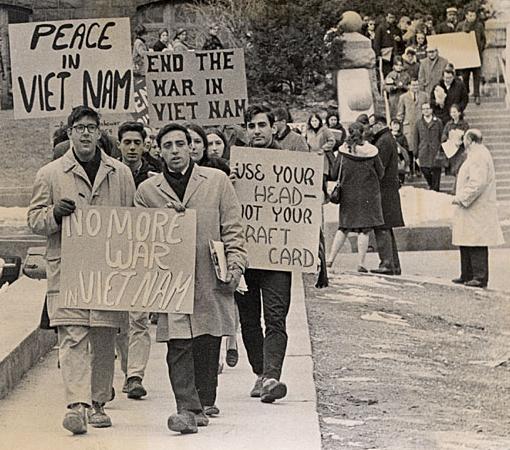
The anti-war movement of the late sixties and early seventies was a short, intense period of social transformation. At the same time it was a continuation of a transgenerational process of striving to bring out the best of humanity. Building on collective actions that came before, the anti-war movement drew on lessons learned from movements like the civil rights movement to develop knowledge, skills and tactics. Learning about the successes, fallibility and failures of the sixties peace movement can inform how we go about social transformation and how we cultivate our own sense of personal responsibility for a greater cause.
Witness to the Revolution: Radicals, Resisters, Vet, Hippies, and the Year America Lost Its Mind and Found Its Soul by Clara Bingham provides an intimate glimpse into the lives of individuals engaged in this period of social change. With interviews from leaders and members of the Students for a Democratic Society, draft dodgers, enlisted soldiers, the Weathermen, the Black Panthers, the Women’s Rights movement, police, marines, politicians, and whistleblowers (with a music playlist to read along to), this book masterfully captures the personal responsibility and socio-cultural dynamics of the time.
“In 1968, there was a convergence of unprecedented events– it’s important to remember that we were twenty-one, twenty-two, twenty-three years old then. We were kids. Most of us did not come out of a political background or framework. We were just learning. And we were learning as New Leftists, meaning we were not part of the old communist left. We were people who’d learned and developed our politics in the streets; we’d come up in activism. We were born in the civil rights movement. We were, then, born in the antiwar movement. We were born in the women’s movement, and the beginning of the queer movement. And there was the environmental movement, and movements of Mexican Americans for land in the Southwest, and of Puerto Ricans for independence. So, all of this ferment was bubbling up and setting context.” Bill Ayers, University of Michigan, SDS Member
The peace movement was a major awakening for many people in society. People who were fairly entrenched in the status quo began to question where things were headed and the culture was prime for people to get connected into larger communities asking the same questions.
“What got me was a sense of moral responsibility, whether you like it or not, it’s your war. This is ours. You participate in a society; you’re responsible for what the society does.” David Harris Stanford student, draft resistance organizer
As people became aware of the atrocities of Vietnam war and the ongoing oppression of marginalized people within the US, they began to wake up to the systems of power and sought a new way of doing things. The converging events of sixties sent individuals and groups into complexity shock resulting in a wide range of responses to the challenges playing out in society. Through Human Learning Ecology and the examples provided in Witness to the Revolution, we can map out how people and groups react to the challenges of the unfolding situation and orient themselves to new possibilities.
As the movement began to build, social justice organizations emerged taking on a lead organizing role. The draft engaged students across the country and organizations found early success with large demonstrations but as time went on most had fractured from both in-fighting and conflict with other groups. We also saw groups fixate on a militant response to the situation and through Witness to the Revolution we hear mixed reflections on the outcomes of this work. In other spaces, we saw the formation of smaller communities testing out new habits and customs on communes and we saw emergence of gurus through which people were offered a sense of naïve fantasy. And still many people at the time sought to maintain the status quo and keep the current ways of doing things.
Witness to the Revolution provides a fascinating glimpse as individuals embedded from across society reflect on their effectiveness, their regrets and their accomplishments 50 years later. It demonstrates the limitations of our human capacity up until that point and the barriers to progress to this day.
“Despite the image of a lot of the decade, it was a time of tremendous conformity and peer pressure.” Robin Morgan, peace activist, poet, feminist
But it also provides examples to inspire us to think about the process of self-cultivation and connecting one’s identity to that of humanity and life. People from all walks of life were recognizing that they had larger roles, responsibilities and privileges to attend to that transcended their immediate situation. Individuals, like whistleblower Daniel Elsberg, took enormous personal risks motivated by resistance and a sense of justice. His pioneering efforts demonstrate the transgenerational need for truth tellers, and we see his influence in the actions of Chelsea Manning and Edward Snowden.
Reflections on the outcome of the anti-war movement speaks to the complexity of social transformation and as a society the frontiers of human and social development are tied up in how we learn to manage and respond to that complexity collectively.
“Today I sit in conversations with people my age recounting all that we accomplished: We created a women’s movement and lives were changed; we put the environmental movement on the map; and we ultimately ended a war and made it harder for the U.S. to choose to go to war. But in the end, the forces of corporate capital essentially beat our generation in terms of the power we wield in this country. We were so focused on all these other things that we didn’t really understand that they were taking control of the country.”Margery Tabankin, University of Wisconsin-Madison, SDS member
While the sixties may have been a leap of progress, we still have much to learn in how to continue to push back ignorance, error, waste, suffering and injustice in the work. With the challenges that face us today, we need to learn as much as we can from this time in order to understand how things came to be and where they could be headed.
“Vietnam, as a factor in the mentality of American foreign affairs, the way we see the world, and the lessons we draw from it, is terribly important. We never really came to grips with the reasons for the mistake to begin with, which was our hubris and our ignorance of another people.” Roger Morris, foreign policy expert served under Nixon
